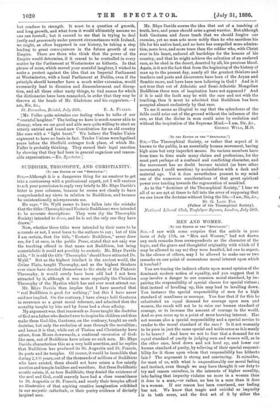BUDDHISM, THEOSOPHY, AND CHRISTIANITY.
[To THE EDITOR OP THE "SPECTATOR.'] SIR,—Although it is a dangerous thing for an amateur to get into a controversy with a professional expert, yet I will venture to ask your permission to reply very briefly to Mr. Rhys Davids's letter in your columns, because he seems not clearly to have comprehended my views in relation to Buddhism, and because he unintentionally misrepresents me.
He says, "Dr. Wyld seems to have fallen into the mistake that the titles (Theosophic and Esoteric Buddhism) were intended to be accurate descriptions. They were (by the Theosophic Society) intended to draw, and he is not the only one they have drawn."
Now, whether these titles were intended by their users to he accurate or not, I must leave to the authors to say ; but of this I am certain, that the title, "Esoteric Buddhism," never drew me, for I at once, in the public Press, stated that not only was the teaching offered in that name not Buddhism, but being materialistic it could not possibly be esoteric. Mr. Rhys Daniels adds, "It is odd the title Theosophic ' should have attracted Dr. Wyld." But as the highest intellect in the ancient world, the divine Plato, taught Theosophy, and as the highest thinkers ever since have devoted themselves to the study of the Platonic Theosophy, it would surely have been odd had I not been attracted by it, although it was more especially the Christian Theosophy of the Mystics which has and ever must attract me.
Mr. Rhys Davids then implies that I have asserted that -4' real Buddhism is good for nothing ;" but this I have never said nor implied. On the contrary, I have always held Gantaina in reverence as a great moral reformer, and admitted that the morality taught by him and by Jesus had a close affinity.
My argument was, that inasmuch as Jesus taught the doctrine of God as a father who desired ever to inspire his children and thus make them God-like, Gauta.ma, on the contrary, taught no such doctrine, but only the evolution of man through the moralities ; and hence it is that, while out of Theism and Christianity have arisen, from Moses downwards, a continual succession of God- like men, out of Buddhism have arisen no such men. Mr. Rho Davids characterises this as a very bold assertion, and be replies that Buddhism has produced its St. Augustin and St. Francis, its poets and its temples. Of course, it would be incredible that during 2,490 years, out of the thousands of millions of Buddhists who have existed, there should not have arisen a few saintly ascetics and temple-builders and versifiers. Bat these Buddhistic ascetic saints, if, as true Buddhists, they denied the existence of the soul and God, could scarcely have had a close resemblance to St. Augustin or St. Francis, and surely their temples afford no illustration of that aspiring creative imagination exhibited in our majestic cathedrals, or their poetry evidence of divinely inspired men. Mr. Rhys Davids scorns the idea that out of a teaching of truth, love, and peace should arise a great warrior. But although both Gautama and Jesus teach that we should forgive our enemies, yet no man acts more nobly than he who sacrifices his life for his native land, and no hero has compelled more admira- tion, more love, and more tears than the soldier who, with Christ ever in his heart, endured all hardships for the honour of his country, and that he might achieve the salvation of an enslaved race, as he shed in the desert, deserted by all, his precious blood. Again, is it not the fact that from the beginning of the history of man up to the present day, nearly all the greatest thinkers and teachers and poets and discoverers have been of the Aryan and. Semitic races, and have been men believing in God ? And is it not true that out of Atheistic and Semi-Atheistic Mongolian Buddhism these men of inspiration have not appeared ? And if it is said the fault may be with the race and not with the teaching, then it must be admitted that Buddhism has been. accepted almost exclusively by that race.
To me it seems as illogical to say that the splendours of the fields could arise out of the ground without the influence of the sun, as that the divine in man could arise by evolution and, without the inspiration of the Supreme Mind.—I am, Sir, &c., GEORGE WILD, M.D.


































 Previous page
Previous page